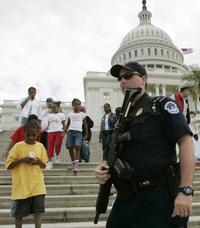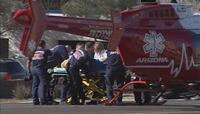-
U.K. joins European fingerprint database
Home Office joins Eurodac fingerprint database, which collects the fingerprints of asylum seekers and some illegal entrants to the European Union; Eurodac consists of a Central Unit within the European Commission, equipped with a computerized central database for comparing fingerprints, and a system for electronic data transmission between EU countries and the database
-
-
Move to strengthen Capitol security in wake of Arizona shooting

Representative Dan Burton (R-Indiana) intends to introduce legislation similar to a measure he presented in 2007 to enclose the House Chamber in a “transparent and substantial material” to prevent people from tossing explosives or shooting onto the floor; since the 1 March 1954 attack on Congress — four Puerto Rican nationalists entered the House visitors’ gallery and fired nineteen shots at members and staff during a vote — and several others involving firearms and explosives, the Capitol has strengthened its security apparatus; it now screens all visitors at an underground security checkpoint located in the Capitol Visitor Center. People who want to watch House and Senate floor proceedings from a visitors’ gallery have to go through an additional set of metal detectors before entering the chamber
-
-
Rep. Clyburn calls for increased spending on lawmakers' safety
After the shooting of Representative Gabrielle Giffords, Representative James Clyburn called for increases in spending to protect lawmakers; the House voted last week to reduce its operating budget by 5 percent; Congressional security officials are currently reviewing security measures and briefing members and their staffers on security
-
-
Sector Report for Tuesday, 11 January 2011: Law Enforcement Technology
This report contains the following stories.
Plus 3 additional stories
-
-
Officials warn of Arizona copycat attacks

Intelligence and law enforcement authorities informed U.S. lawmakers that they are monitoring for potential “copycat” attacks on lawmakers after the rampage in Arizona on Saturday; Rep. Peter King, chairman of the House Homeland Security Committee, said he expects to ask for a formal report on the shooting, addressing both the short-term concerns — including the likelihood of copycat incidents — and long-term issues with security; among the questions he wants answered, King said, are “Is this part of a larger movement? Is there any evidence he [the assailant] was motivated by organizational structure?” FBI director Robert Mueller said: “Given this tragedy, all logical precautions are in place to best ensure the safety of other public officials, but there is no information at this time to suggest any specific threat remains”
-
-
Miami Police first to use UAVs in a U.S. city
The Miami-Dade Police Department could soon become the first police department in the country to employ unmanned drones; the department acquired two T-Hawk Micro Air Vehicles, manufactured by Honeywell, in August 2009, and has been testing and training with them since; it is now in the third phase of a three-phase testing program, and plans to apply soon to the FAA for final approval to use the drones in operations
-
-
California police use electric motorcycles
The Scotts Valley Police Department is the first law enforcement agency in California to accept delivery of a Zero DS electric motorcycle; it will be a benchmark for evaluating the performance capabilities of the Zero DS in law enforcement situations, such as responding through traffic and on local bike trails
-
-
Ashland, Alabama, police adopts new technology
Six years ago there was one computer in the Ashland, Alabama, Police Department; Several grants and nearly $300,000 later, officers are typing up reports on in-car computers, scanning fingerprints, and instantly checking for matches with other police departments around the state
-
-
Law enforcement officials adapting to the cell phone age
Law enforcement officials are collecting more cell phone numbers for emergency alert phone lists as more people move away from land telephone lines; during emergencies land telephone lines are often knocked down and first responders do not have many cell phone numbers on file; emergency cell phone technology is rapidly improving with more accurate traces; 911 first responders hope to incorporate video, text, and photos in the future to better assess emergencies and communicate
-
-
Quick Heal introduces technology to track laptops
New laptop tracking technology will help Indian police track and locate stolen laptops across the country; Quick Heal, the company offering the technology, also aims to create a centralized database of lost or stolen laptops; the database will be accessible to retailers and consumers
-
-
Newly developed cloak hides underwater objects from sonar
University of Illinois researchers develop an acoustic cloak, a technology that renders underwater objects invisible to sonar and other ultrasound waves; an advantage of the acoustic cloak is its ability to cover a broad range of sound wavelengths; the cloak offers acoustic invisibility to ultrasound waves from 40 to 80 KHz, although with modification could theoretically be tuned to cover tens of megahertz
-
-
New Israeli technology speeds up warfare
Israel is among several nations harnessing digital and satellite technology to develop C4I systems — short for “command, control, communications, computers and intelligence” — that integrate battlefield information.; one Israeli officer says the goal is to have “all the elements of a force —- seeing the same tactical picture, and you can move information from one to the other completely seamlessly”
-
-
Shaken lawmakers weigh additional security measures

Following the shooting of Representative Gabrielle Giffords (D-Arizona), more than 800 participants — members of Congress, their spouses, and staffs — take part in a conference call Sunday; the FBI, House Sergeant at Arms Bill Livingood, and U.S. Capitol Police Chief Phil Morse detailed security measures lawmakers and their family members should take both in Washington, D.C. and in their home districts; another security briefing for lawmakers is scheduled for Wednesday; the last time a member of Congress was shot and killed was in 1978, when Representative Leo Ryan (D-California) tried to leave Jonestown, Guyana, with members of Jim Jones’s cult; six members of Congress have been murdered as well as two senators — Huey Long in 1935 and Robert Kennedy in 1968; five members of Congress were injured when Puerto Rican nationalists shot up the House chamber on 21 March 1954
-
-
Suspected Arizona gunman passed FBI background check
The alleged shooter of Representative Giffords and eighteen other people in Arizona purchased a firearm legally — and after passing an FBI background check — from Sportsman’s Warehouse’s Tucson store in November; Loughner did not present a concealed weapons permit so he was required to pass an FBI background check, which he did “immediately and without incident,” the company which owns the store says; a DHS memo ties Loughner to the extremist group American Renaissance, which DHS describes as “anti-government, anti-immigration, anti-ZOG (Zionist Occupational Government), anti-Semitic”; the group leader says Loughner had no connection with his group
-
-
New laser weapon dazzles, confuses pirates
There were 430 pirate attacks last year, an increase of 5.6 percent on the previous year; in a bid to develop a suitable non-lethal weapon to help fend off this threat, BAE Systems studied pirate behavior; the conclusion was that an automatic weapon was needed, one that would not put any of the crew at risk, and one which would distract suspected pirates rather than harm them
-
More headlines
The long view
Why Was Pacific Northwest Home to So Many Serial Killers?
Ted Bundy, Gary Ridgway, George Russell, Israel Keyes, and Robert Lee Yates were serial killers who grew up in the Pacific Northwest in the shadow of smelters which spewed plumes of lead, arsenic, and cadmium into the air. As a young man, Charles Manson spent ten years at a nearby prison, where lead has seeped into the soil. The idea of a correlation between early exposure to lead and higher crime rates is not new. Fraser doesn’t explicitly support the lead-crime hypothesis, but in a nimble, haunting narrative, she argues that the connections between an unfettered pollution and violent crime warrant scrutiny.
Bookshelf: Smartphones Shape War in Hyperconnected World
The smartphone is helping to shape the conduct and representation of contemporary war. A new book argues that as an operative device, the smartphone is now “being used as a central weapon of war.”
